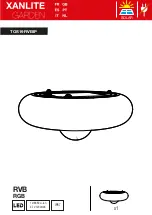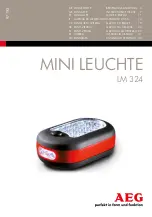
IMPORTANT!
It is essential that you read the instructions in this manual
before assembling, operating, and maintaining the product.
Subject to technical modifications.
Safety, performance, and dependability have been given
top priority in the design of your clamp light.
INTENDED USE
The clamp light is intended for general illumination. Do not
use the product in wet conditions.
The product is not intended for clamping on tubular
materials.
When clamping, the material being clamped must be pushed
to the deepest point of the clamp for increased stability.
Do not use the product for any other purpose. Use of the
product for operations different from intended could result in
a hazardous situation.
CLAMP LIGHT SAFETY WARNINGS
■
The light source contained in this luminaire shall only be
replaced by the manufacturer or his service agent or a
similar qualified person.
■
Use only with recommended battery pack and charger.
Any attempt to use another battery pack will cause
damage to the product and could possibly explode,
cause a fire, or personal injury.
■
Do not disassemble the product.
■
If wrapped or in contact with fabrics, the lens can
produce sufficient heat to melt some fabrics. To avoid
serious personal injury, never allow the lens to come in
contact with anything.
■
Do not place the product or battery pack near fire or
heat. This will reduce the risk of explosion and possible
injury.
■
Remove the battery pack or disconnect the mains power
before starting any work on the product.
■
Do not store the product in a damp or wet location, or in
a location where the temperature may reach or exceed
40°C. For example, inside sheds, vehicles, or metal
buildings in the summer.
■
Do not direct the light beam at persons or animals and
do not stare into the light beam yourself (not even from
a distance). Staring into the light beam may result in
serious injury or vision loss.
BATTERY SAFETY WARNINGS
■
To reduce the risk of fire, personal injury, and product
damage due to a short circuit, never immerse your
tool, battery pack or charger in fluid or allow a fluid to
flow inside them. Corrosive or conductive fluids, such
as seawater, certain industrial chemicals, and bleach
or bleach-containing products, etc., can cause a short
circuit.
TRANSPORTING LITHIUM BATTERIES
Transport the battery in accordance with local and national
provisions and regulations.
Follow all special requirements on packaging and labelling
when transporting batteries by a third party. Ensure that
no batteries can come in contact with other batteries
or conductive materials while in transport by protecting
exposed connectors with insulating, non-conductive caps or
tape. Do not transport batteries that are cracked or leaking.
Check with the forwarding company for further advice.
MAINTENANCE
■
Use only original accessories and spare parts. Should
components need to be replaced which have not been
described, please contact an authorised service centre.
All repairs should be performed by an authorised service
centre.
■
Avoid using solvents when cleaning plastic parts. Most
plastics are susceptible to various types of commercial
solvents and may be damaged by their use. Use clean
cloths to remove dirt, carbon dust, etc.
■
Do not at any time let brake fluids, gasoline, petroleum-
based products, penetrating oils, etc., come in contact
with plastic parts. Chemicals can damage, weaken or
destroy plastic which may result in serious personal
injury.
SYMBOLS ON THE PRODUCT
V
Volts
Direct current
The rated maximum ambient temperature
Regulatory Compliance Mark (RCM). Product
meets applicable regulatory requirements.
Please read the instructions carefully before
starting the machine.
Class III protection
2
Original Instructions
Содержание RLCL18
Страница 1: ...FRONT PAGE RLCL18...
Страница 5: ...2 1 100 25 0 1 2 5 Getting started...
Страница 7: ......

























